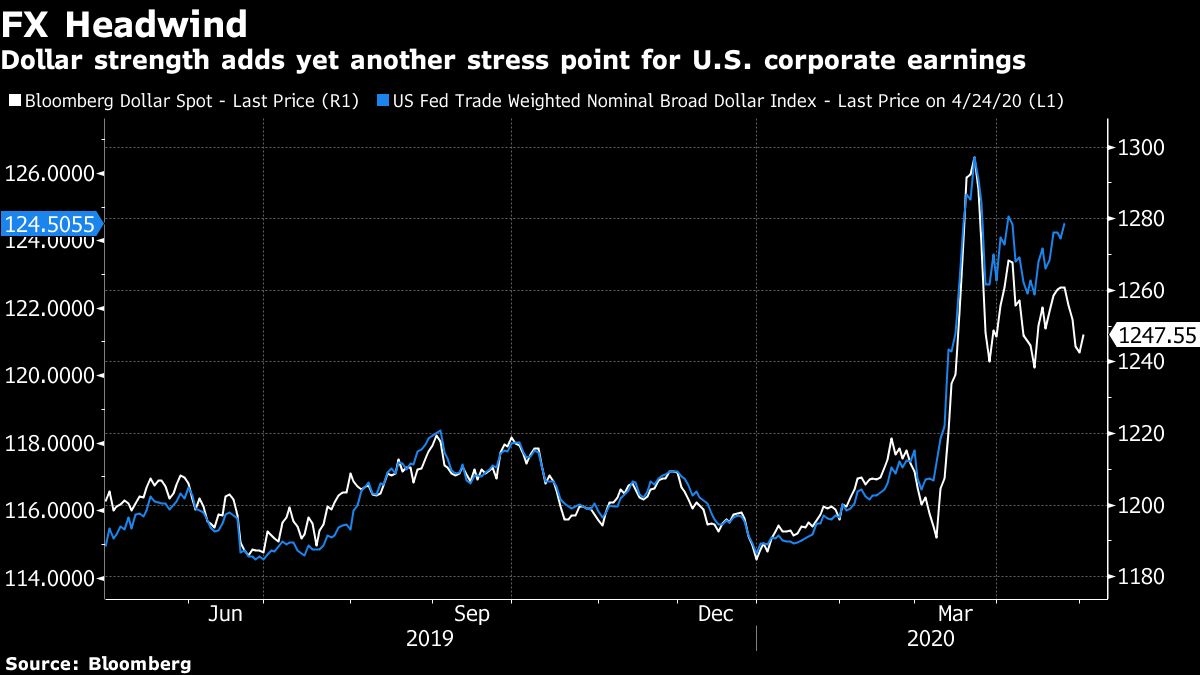May 2, 2020
Apple's US$1.5-billion headwind adds FX to litany of company woes
, Bloomberg News
Tech fears weigh on markets
U.S. multinational companies have begun to feel the sting of a strong dollar on their bottom lines, and there’s no guarantee the pain will go away as economies around the world attempt to reopen.
Dozens of corporations, from Apple Inc. and Facebook Inc. to Harley-Davidson Inc., have warned the U.S. dollar’s appreciation is hurting foreign revenue. Even Netflix Inc., which benefited last quarter as much of the world was forced to stay at home, said overseas sales gains from rising subscriptions are being offset by a “sharply stronger” dollar.
Since the novel coronavirus began spreading in Asia early this year, broad measures of the dollar have surged to records as investors flocked to havens like the greenback and corporations hoarded cash. While the economic fallout poses more acute problems for companies, the headwinds from exchange rates could linger even as business rebounds.
“So let’s suppose we stabilize here or drop one per cent,” said Greg Anderson, global head of FX strategy at the Bank of Montreal. “That still leaves U.S. firms facing a big headwind in their attempts to sell U.S.-produced goods overseas. Even if U.S.-based multinationals produce in-country rather than in the U.S., it still still hurts year-over-year earnings after you translate them back into U.S. dollars.”
That hypothetical drop in the trade-weighted dollar would price in improved “global disease dynamics” and a flight away from safety as governments take actions to restore investor confidence, Anderson said. While experts say a second wave of virus infections is inevitable as the world reopens for business, it’s likely to occur later on this year.
The Bloomberg Dollar Spot Index, which tracks the greenback against a basket of global currencies going back to 2005, rose 5.2 per cent in the first quarter this year and ended it about 4.7 per cent above its average level during the same period of 2019. Among the Group-of-10 currencies, the greenback has strengthened versus all but the Japanese yen and the Swiss franc this year.
Both the Bloomberg index and the Fed’s trade-weighted dollar index, which measures the currency versus 26 of America’s biggest trading partners, have inched slightly lower since peaking in March. Yet analysts expect dollar strength to linger, at least for the second quarter. With the deepest recession in generations likely unfolding, governments are introducing fiscal stimulus packages that may weaken their currencies further.
While the currency’s strength is just one of a myriad of stresses that businesses are dealing with, it’s still a material hit to sales for many. Exchange rates knocked one per cent off of Apple’s US$58.3 billion in sales in the latest quarter, Chief Financial Officer Luca Maestri said on the company’s earnings call. The headwind is expected to grow in the current quarter and reduce revenue by more than US$1.5 billion at Apple, which on Thursday joined the growing ranks of companies refraining from providing sales and earnings guidance due to economic uncertainty.
Facebook put the quarterly hit to revenue at US$275 million, while Harley-Davidson was dinged for almost US$11 million.

‘Another Residual Problem’
“If it was any other quarter, besides during one amid this pandemic, what the dollar did would be a huge issue,” said Jim Paulsen, chief investment strategist at the Leuthold Group Inc. in Minneapolis. “But now it’s just another residual problem on the list.”
Multinational companies also faced strong currency headwinds in early 2019 after a bout of greenback weakness in the prior year, but the dollar remained mostly range-bound last year so the effect was subsiding.
And while multinationals are often positioned to offset foreign currency volatility with hedges, the sudden strength in the dollar was as unpredictable as the extent of the virus. The widespread depreciation of foreign currencies has caught companies such as Merck & Co. off-guard.
“It’s hitting us across all of our currencies,” Robert Davis, Merck’s chief financial officer, said on an April 28 earnings call. “But importantly, what’s happening as well, and we’re not able to hedge as much as we normally would, is because we are also seeing a material impact in the emerging-market currencies, as well, where we don’t hedge today.”
Each eight-per-cent rise in the value of the dollar causes, on average, a one-per-cent hit to corporations’ revenue, according to estimates from Jonathan Golub, chief U.S. equity strategist at Credit Suisse.
“There was a decent strengthening of the dollar over the first quarter,” Golub said. “And it has and will be noticeable to earnings. But the real issue, for now, is that for some companies there is no business.”






